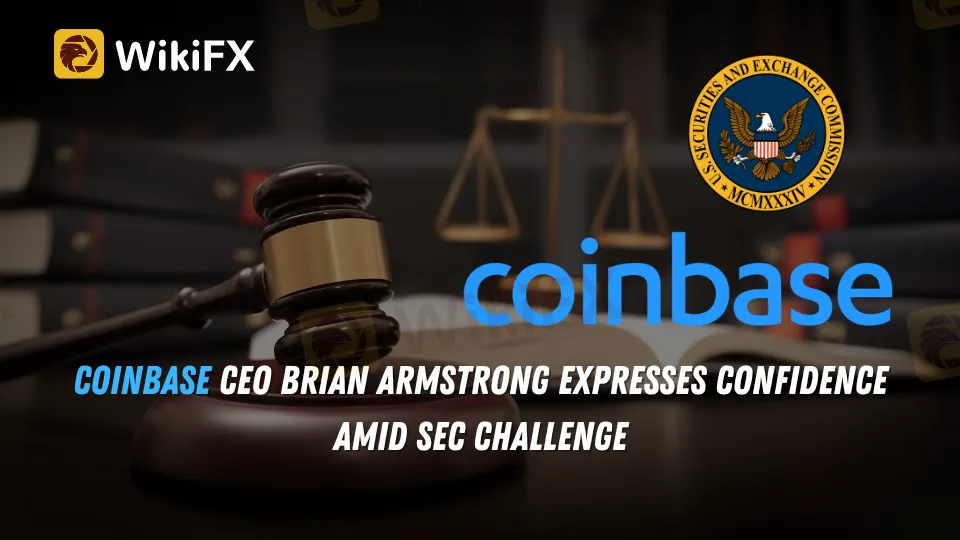简体中文
繁體中文
English
Pусский
日本語
ภาษาไทย
Tiếng Việt
Bahasa Indonesia
Español
हिन्दी
Filippiiniläinen
Français
Deutsch
Português
Türkçe
한국어
العربية
Coinbase CEO Brian Armstrong Expresses Confidence Amid SEC Challenge
Abstract:Despite facing SEC allegations, Coinbase CEO Brian Armstrong remains confident, maintaining it's 'business as usual.' Armstrong assures stakeholders that the situation will be resolved.

Coinbase Global (COIN) CEO, Brian Armstrong, responded robustly to the legal allegations recently brought against his firm by the Securities and Exchange Commission (SEC). Despite the challenging situation, Armstrong expressed optimism, ensuring stakeholders that the situation would be resolved and that it was still “business as usual” for Coinbase.
SEC Accusations Against Coinbase
The SEC claims that Coinbase, the biggest cryptocurrency exchange in the United States, violated securities laws. According to the government, Coinbase operated as an exchange, broker, and clearing agency without being properly registered. Furthermore, the SEC claimed that Coinbase offered and sold securities without registering these offers and sales.
Brian Armstrong, however, repudiated these claims during his appearance at a Piper Sandler event, as well as on CNBC and CNN. He pointed out the fact that despite attempts to address the SEC's concerns and seek guidance, Coinbase was largely overlooked by the agency.
Armstrong on Regulatory Challenges
Armstrong expressed frustration with the regulatory environment, stating, “I don't really think there is a way to register, there's basically no way to do it. We've tried repeatedly in the US.” Coinbase, he highlighted, has met with the SEC over 30 times. His description of these meetings with the SEC was one of an “icy reception”.

In response to Armstrong's question about how Coinbase could achieve regulatory compliance, the SEC simply advised that the exchange should consult with its legal counsel, declining to offer any legal advice of its own.
Conflicts in the Crypto Regulatory Landscape
The Coinbase CEO dubbed the US crypto regulatory landscape as an “outlier” among nations. He noted the conflicting perspectives between the SEC and the Commodities Futures Trading Commission (CFTC) over which body should be regulating the spot crypto market, as no clear jurisdiction has been inscribed into law.
SEC chair Gary Gensler has consistently stated that cryptocurrency companies issuing or offering the sale of cryptocurrencies that are considered securities must register with the securities regulators or risk facing charges. These regulations are grounded in the Howey Test, a framework established by a 1946 Supreme Court case.
The SEC's Stance and Coinbase's Position
In the SEC's case against Coinbase, 13 cryptocurrencies traded on the exchange platform were deemed securities. The agency alleges that Coinbase violated securities laws by offering these securities for sale. Despite the SEC's allegations, Armstrong insisted that it's “business as usual” for Coinbase. The exchange plans to continue enabling trading in the assets the SEC identifies as securities.
Coinbase maintains a rigorous review process for its token listing, screening applicants with Howey test-related questions. The firm rejects 90% of received applications based on legal criteria. The SEC's allegations suggest that in the pursuit of growth and increased trading profits, Coinbase has chosen to list crypto assets with higher “risk” scores according to the Howey Test-like rating framework.
Looking Ahead
While the SEC continues to press for stricter regulatory compliance, Armstrong remains confident in the future of Coinbase. He assured that the firm is committed to resolving the current situation, emphasizing the continuation of normal operations. Despite the ongoing challenges, Armstrong's firm belief in his company and its future resonates, “This will get resolved,” he assured.
To keep abreast of the latest news, install the WikiFX App on your mobile device. You can download the app using this link: https://social1.onelink.me/QgET/px2b7i8n

Disclaimer:
The views in this article only represent the author's personal views, and do not constitute investment advice on this platform. This platform does not guarantee the accuracy, completeness and timeliness of the information in the article, and will not be liable for any loss caused by the use of or reliance on the information in the article.
Read more

Japan’s Shift in Crypto Policy and What It Means for Investors
Japan’s ruling Liberal Democratic Party (LDP) is moving forward with regulatory changes to update how cryptocurrency is taxed and classified. The proposed reforms aim to lower the capital gains tax on digital assets to 20% and officially recognise cryptocurrencies as a separate asset class within financial regulations.

Donald Trump’s Pro-Crypto Push Boosts PH Markets
Donald Trump’s pro-crypto stance lifts PH markets with a strategic reserve of Bitcoin, Ether, XRP, Solana, and Cardano, driving a 10% surge in crypto value.

Is Pi Network the Next Big Crypto Opportunity?
Pi Network’s price is up 190%. Could it be the next big crypto investment? Explore its growth potential, ETF prospects, exchange listings, and risks.

Is $CORONA Memecoin a Legit Crypto Investment?
Explore if "$CORONA" memecoin is legit as Italy’s CONSOB bans its offer and blocks 11 crypto sites under MiCAR, targeting unauthorized services.
WikiFX Broker
Latest News
Is $CORONA Memecoin a Legit Crypto Investment?
Is Pi Network the Next Big Crypto Opportunity?
Donald Trump’s Pro-Crypto Push Boosts PH Markets
Japan’s Shift in Crypto Policy and What It Means for Investors
Is Linkbex a Scam? SFC Warns of Virtual Asset Fraud in Hong Kong
5 Best Copy Trading Brokers: You Can Trust in 2025
3 EXCLUSIVE Ramadan Offers That Won’t Last Long! ACT NOW
The Next Crypto Giants: 5 Altcoins to Watch
Forex Trading: Scam or Real Opportunity?
The Hidden Tactics Brokers Use to Block Your Withdrawals
Currency Calculator






